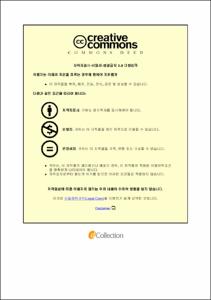놀이무용 프로그램이 유아의 사회성 발달에 미치는 영향
- Abstract
- 본 연구는 놀이무용 프로그램이 유아의 사회성 발달에 미치는 영향을 살펴보고자 하였다. 본 연구에서 활용한 놀이무용 프로그램은 김화숙(2006)의 창작무용 프로그램의 단계적 모델 4단계인 신체인식, 공간인식, 즉흥표현법, 상상표현법을 기초로 하였고, 유아의 발달과 흥미에 맞춰 만 4세 누리과정의 생활주제에 관련된 주제로 구성되었다. 연구대상은 U시 중구에 위치한 A유치원에 재원 중인 만 4세 중 놀이무용 프로그램에 참여한 15명(실험집단)과 같은 시간에 미술 프로그램에 참여한 15명(비교집단)으로 총 30명이었다.
연구도구로는 용희숙(2010)이 Vineland(1977)의 사회성숙도 검사를 수정·보완하여 재구성한 유아의 사회성 발달 평정척도를 사용하였다. 사전·사후검사는 담임교사가 실시하였다. 사전검사 이후 실험집단은 3월 18일부터 4월 26일까지 6주간 매주 3회씩 총 18차시 놀이무용 프로그램에 참여하였고, 비교집단은 미술수업으로 그림그리기, 만들기, 종이접기 수업에 참여하였다.
프로그램 적용이 끝난 후 사후검사를 실시하여 실험집단과 비교집단의 사회성 발달의 변화를 살펴보았다. 자료분석은 SPSS Win 21.0 프로그램을 이용하여 분석하였고, 놀이무용 프로그램이 유아의 사회성 발달에 긍정적인 효과가 있는지를 확인하기 위해 사전검사와 사후검사의 평균 차이 검정을 위해 대응표본 t-검정을 실시하였다.
본 연구를 위한 연구문제는 다음과 같다.
연구문제 1. 놀이무용 프로그램은 유아의 사회성 발달에 영향을 미치는가?
1-1. 놀이무용 프로그램이 유아의 사회성 하위요인인 협동성에 영향을 미치는가?
1-2. 놀이무용 프로그램이 유아의 사회성의 하위요인 중 타인이해성에 영향을 미치는가?
1-3. 놀이무용 프로그램이 유아의 사회성의 하위요인 중 자율성에 영향을 미치는가?
1-4. 놀이무용 프로그램이 유아의 사회성의 하위요인 중 또래 간 상호작용에 영향을 미치는가?
이러한 과정을 통해 도출된 본 연구의 결과를 종합해보면 다음과 같다.
첫째, 놀이무용 프로그램을 수행한 실험집단의 협동성은 실험 후 비교집단보다 통계적으로 더 유의한 향상이 있었다.
둘째, 놀이무용 프로그램을 수행한 실험집단의 타인이해성은 실험 후 비교집단보다 통계적으로 더 유의한 향상이 있었다.
셋째, 놀이무용 프로그램을 수행한 실험집단의 자율성은 실험 후 비교집단보다 통계적으로 더 유의한 향상이 있었다.
넷째, 놀이무용 프로그램을 수행한 실험집단의 또래 간 상호작용은 실험 후 비교집단보다 통계적으로 더 유의한 향상이 있었다.
이상의 결과를 통해 유아의 사회성 발달에 놀이무용 프로그램이 매우 긍정적인 영향을 미치는 것을 알 수 있었다. 즉, 놀이무용은 유아들의 사회성 발달에 필요로 하며 움직임 교육이 유아들에게 필요함을 시사하여 주고 있다.|This thesis examined the effect of play dance program on children’s social development. The play dance program was based on the 4th stage of the creative dance program of Kim, Hwa-Sook (2006) focusing on the body perceptions, space recognition, improvisation expression, and imagination expression. The program's content was related to the theme of life in four-year-olds' curriculum in line with the development and interest of the infant. Thirty children participated in the study: Fifteen children (experimental group) participated in the play dance program and others(comparative group) participated in the art program during at the afterschool program of A kindergarten in Ulsan.
Preliminary and post-test of socio-emotional development was rated with the scale developed by Hee-Sook Yong (2010) using the social maturity test of Vineland(1977). The experimental group participated in the 18-hour dance program for during six weeks(three times a week) from March 18th to April 26th while the comparative group participated in painting, making, and paper folding classes.
Data were analysed using the SPSS Win 21.0 program. Research questions for this study are as follows.
Research question 1. Does the play dance program affect the social development of infant?
1-1. Does the play dance program affect the cooperativeness of the children?
1-2. Does play dance program affect the comprehensibility toward others of children?
1-3. Does the play dance program affect the autonomy of children?
1-4. Does play dance program affect peer interaction of children?
The results were as follows.
First, there was more significant improvements in social development in the experimental group compared with the comparative group: The experimental group showed more improvements in cooperativeness, omprehensibility toward others, autonomy and peer interaction of socio-emotional development. Therefore, the results of this study showed that play dance is beneficial for the development of infants’ sociality. Future studies are needed for various play dance programs.
- Issued Date
- 2019
- Awarded Date
- 2019-08
- Type
- Dissertation
- Alternative Author(s)
- Lee Yu Ri
- Affiliation
- 울산대학교
- Department
- 교육대학원 유아교육전공
- Advisor
- 박혜원
- Degree
- Master
- Publisher
- 울산대학교 교육대학원 유아교육전공
- Language
- kor
- Rights
- 울산대학교 논문은 저작권에 의해 보호받습니다.
- Appears in Collections:
- Education > Early Childhood Education
- 파일 목록
-
-
Download
 200000222570.pdf
기타 데이터 / 548.3 kB / Adobe PDF
200000222570.pdf
기타 데이터 / 548.3 kB / Adobe PDF
-
Items in Repository are protected by copyright, with all rights reserved, unless otherwise indicated.